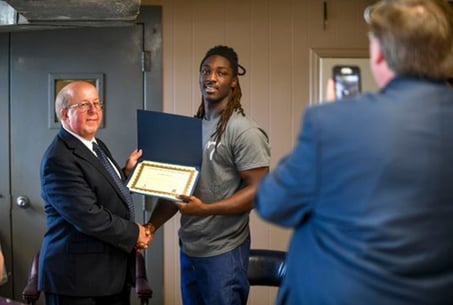InsideOut Dad program graduates largest class to date
3 min read
Date Published: 10/11/2018
Last Updated: 11/22/2024
National Fatherhood Initiative Blog / Latest Articles
3 min read

Photo: Jarnakin Brown receives his diploma from Tim Carothers during a graduation ceremony for the InsideOut Dad program at Madison County Penal Farm in Jackson, Tenn., on Thursday, Oct. 4, 2018. (Photo: Henry Taylor / The Jackson Sun)
The Madison County Penal Farm graduated its largest class to date from a re-entry program called InsideOut Dad on Thursday. Seven inmates received certificates for completing the 12-week InsideOut Dad program, which aims to reduce recidivism in inmates and give them tools to be better fathers.
Southwest Human Resource Agency runs the program in conjunction with Madison County corrections, also providing the service to other counties in the area — Chester, Decatur, Hardeman, Hardin, Haywood, Henderson, McNairy, along with Madison.
"What we're trying to do through this program is develop a means and a way for people when they get out to stay out," SHRA Executive Director Mike Smith told the graduating inmates. "We're going to connect you to jobs and opportunities and all different kinds of things that we want you to take advantage of. I want to challenge you today to take this opportunity to make your life better — not just for you, but for your family."
Each inmate wore a T-shirt with "24/7" printed on it, made up of dozens of lines of the word "dad." Smith said this is to remind the graduates that "you're a responsible person 24 hours a day, seven days a week. You can be a better father, you can be a better husband, a better son."
The program has graduated approximately 165 people to date in about 33 classes since it started roughly four years ago, Re-Entry Coordinator Tim Carothers said. The average recidivism rate for inmates who complete the program is under 10 percent, and Southwest Human Resource Agency estimates that InsideOut Dad has saved the eight counties it serves approximately $1.5 million since it started.
Class participant Carey Demoss said the program gave him valuable tools to help him interact with his children and others.
"[The] thing I learned out of the program is how important I am as a father," Demoss said before receiving his completion certificate. "In a situation like this, I kind of feel helpless. I can't be there for my kids. But [in] doing the class, I learned different ... skills that I could use to help me as well as my kids while I'm incarcerated."
The program is held once a week for about an hour, according to Carothers. Its main focus is teaching participants the value of fathers in the home, and communication and decision making skills to improve the quality of family life.
Nearly 20 million children in the United States are living without a father, according to the 2017 U.S. Census Bureau.
"We tell them they're irreplaceable [as fathers]," Carothers said. "There's nobody that can take their place, and we encourage them to be cooperative at home."
Carothers said some of the fathers in the program have children who are currently with foster parents or other guardians, so the instructors address how to communicate in this situation as well.
"We encourage them to try to build bridges and make inroads to these relationships so that they can improve not only themselves but also make things better for the child," Carothers said.
The program also helps inmates learn interviewing skills, access job search options, and build their own résumés, which were handed to them along with their certificates at the graduation.
Participant Dustin Alexander said he decided to be part of the program to be a better father to his daughter, who is now about nine months old. After receiving his certificate, he sat down with family members and fed his daughter a bottle.
He said he's looking forward to getting out of jail and "getting back to normal life."
"And being able to be there to be a good father for her," Alexander said.
Demoss said he has incorporated some of the things he learned in the class in communicating with other inmates in his unit as well as with his children. Before receiving his certificate, he also paused to recognize his mother, who was sitting in the audience.
"As much credit as I tried to give to men in my life, I've got to give credit to my mama," Demoss said. "She's here today, and I just want to dedicate this award to her."
Demoss' mother, Jimmie Ruth Douglas, said Demoss is her oldest son, and had become the "man" of the house when his father passed away. Douglas said it was "really hurtful" to see him go to jail, but that she is proud to see him succeed in this program.
"I'm just ecstatic," Douglas said. "I feel very proud ... that he wanted me to even be a part of it."
Though not everything will be smooth sailing from here on out for these men, Carothers said this is something they teach participants how to deal with.
"We tell everybody this is not a miracle pill," he said. "This is not a magic wand that you can wave and everything's going to be perfect from now on. We've talked about challenges ... and we wanted to give them the encouragement that they need to be successful upon re-entry. If we've done that even in small measure, then our time together has been well spent."
This article originally appeared at JacksonSun.com and was reposted with permission from Cassandra Stephenson. Contact Cassandra at ckstephens@jacksonsun.com or at (731) 694-7261.
Date Published: 10/11/2018
Last Updated: 11/22/2024
Download the ebook to learn how to create fatherhood initiatives that engage every sector of community life.

Train Your Staff
Fatherhood Programs
Fatherhood Data
© 2025 National Fatherhood Initiative®. All rights reserved.